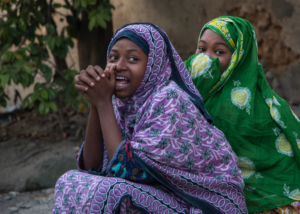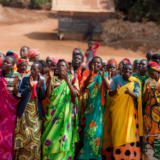Have you ever wondered what is behind the unique African names? Today we will take an imaginary trip to Eastern Africa to catch a glimpse of one of the most fascinating ethnic groups in the area: the Swahili people.
Who are they?
The Swahili people are believed to date back to the 5th century and their culture crosses the borders of 10 African states, reaching from RD Congo to the north-western Madagascar.
Swahili, also known as Kiswahili, represents the language of the Swahili people. A significant part of the language derives from Arabic, and, in the past, the language used to be written in the Arabic script. Their culture and religious life also has strong Arabic influences. However, the language currently uses the Latin alphabet which was introduced by the Christian missionaries and colonial administrators. The exact number of people who speak this language could not be determined, though it is estimated that there are over 50 million speakers.
Swahili Naming Traditions
Choosing the right name
The process of naming a child is very important for the Swahili community and it involves consultation with the family elders, with the religious leaders and with any other person who is important for the family. Children usually receive their names on the 7th day of their life.
A common tradition among the Swahili people is to gather a certain number of names, write them on pieces of paper and scatter them on the floor so that the baby can pick one up. The baby will then receive the name written on the paper he chose.
Swahili names, as well as most African names, have special meanings and they are never randomly chosen. It is considered that the name given to a new-born will influence his life and personality traits.
The name of the baby is very often connected to the birth circumstances, such as timing of the birth, time of the day, day of the week, the position in the family or any important event taking place surrounding the conception of the child. On the other hand, the name can also represent a promise for the future, namely the expectations the parents have from their child.
Here are some examples of Swahili names and their meaning:
A mix of traditions
People sometimes have patronymic names, they take the given name of their father or grandfather or another relative, and this is usually the third name. For example, a man can be called Robert Mboya Hamisi, where Hamisi is the father’s name.
Furthermore, the patronymic name can be preceded by the Arabic prefixes bin (meaning son of) or binti (meaning daughter of). For example, Saad’s children could be called Siti binti Saad, if it’s a girl, or Juma bin Saad, if it’s a boy.
The usage of patronymic names shows the Swahili people’s strong connection with their past. It creates a meaningful relation between the past and present generations and, in some communities, children are also given the name of an ancestor for protection.
Many religious names are also present among the Swahili people and among African people in general. This highlights the importance of religion and it shows how real their connection with a Supreme Being is. The most common ones are Muslim and Christian names, such as John, Jacob or Mohamed.
Most traditional names can be used both as given names and surnames and there is no set rule for the name structure. However, a relatively small percentage of the population has adopted the Western style. Schools and other official institutions have recently begun to use the patronymic name as a family name.
Inherited identity
What differentiates the African people from other communities is the unique symbolistic of their culture and their strong bound to their traditions and history. It is important to remember that the African countries have a tough history, many of them have been colonized throughout centuries and forced to adapt to new customs which were completely different from their own culture, including changing their native names.
It is said that in order to destroy the power of a nation, you must first destroy their name. One of the ways in which African people fought back was by passing their traditional names from one generation to another. The Swahili names (and African names in general) encapsulate the connection between nature, family, history and traditions and they are crucial in defining one’s identity.
Photo Sources:
- Mount Kilimanjaro:https://www.flickr.com/photos/ninara/8503426418/
- Happy girls in Zanzibar (photo by Eric Pauwels):https://www.flickr.com/photos/eric2905/14628488360/in/album-72157645867227631/
- Colorful market in Zanzibar:https://www.flickr.com/photos/jorgecancela/23475228571/in/photostream/











